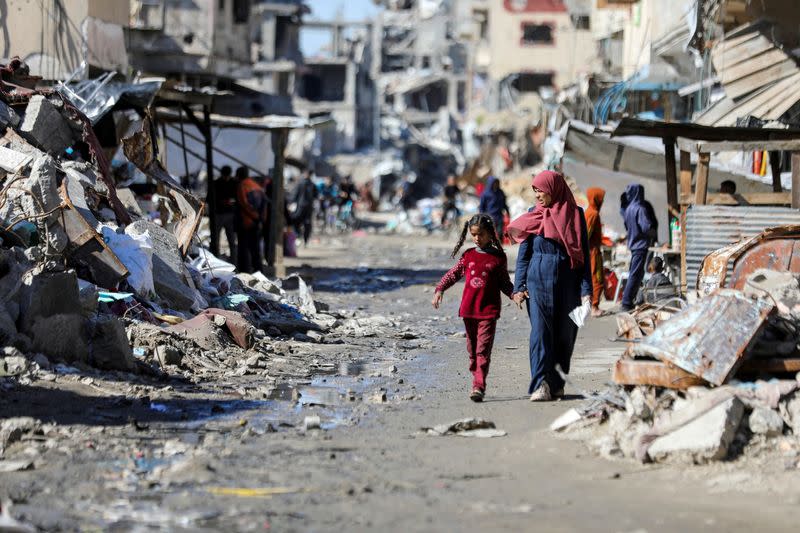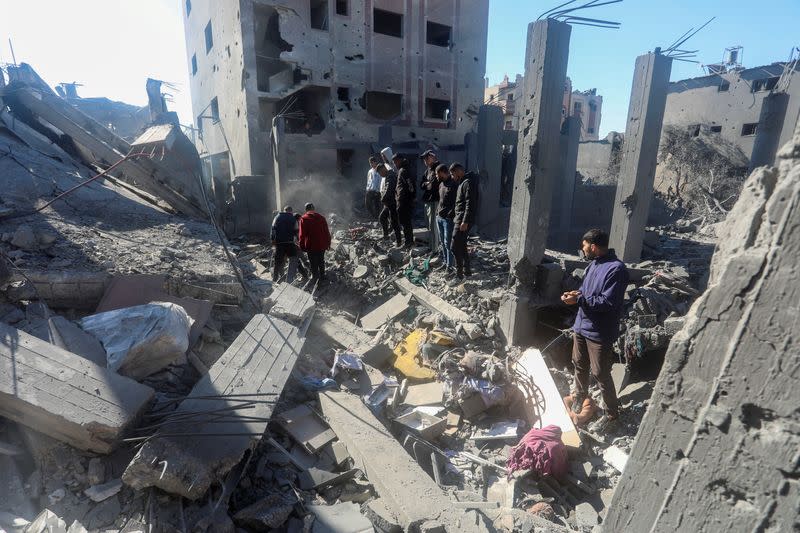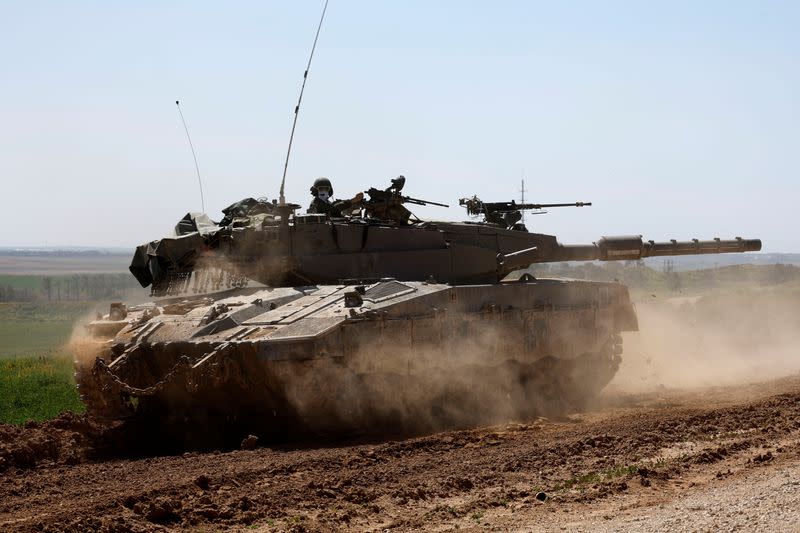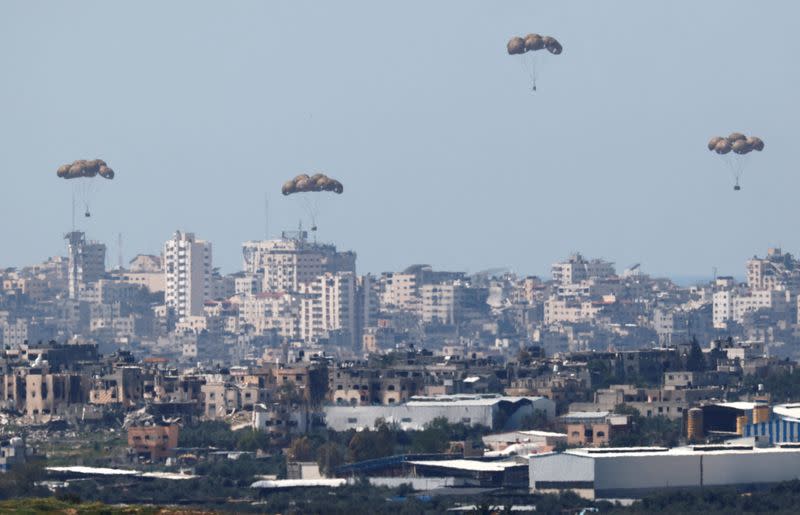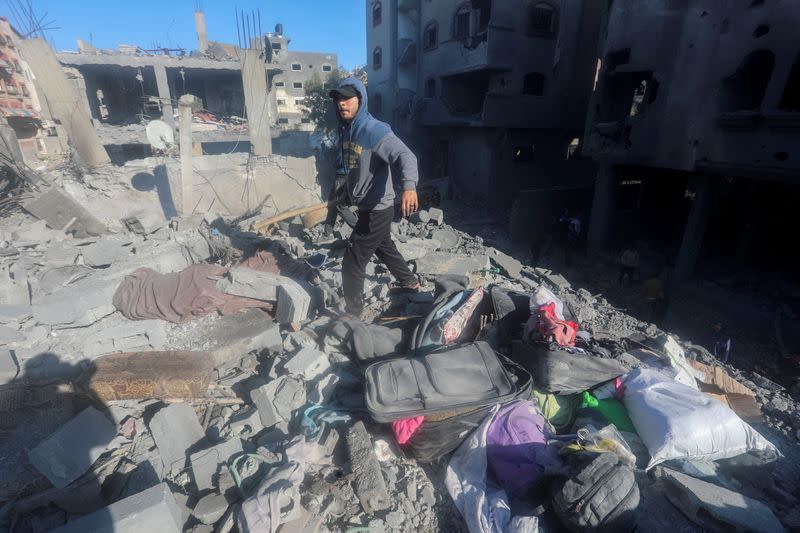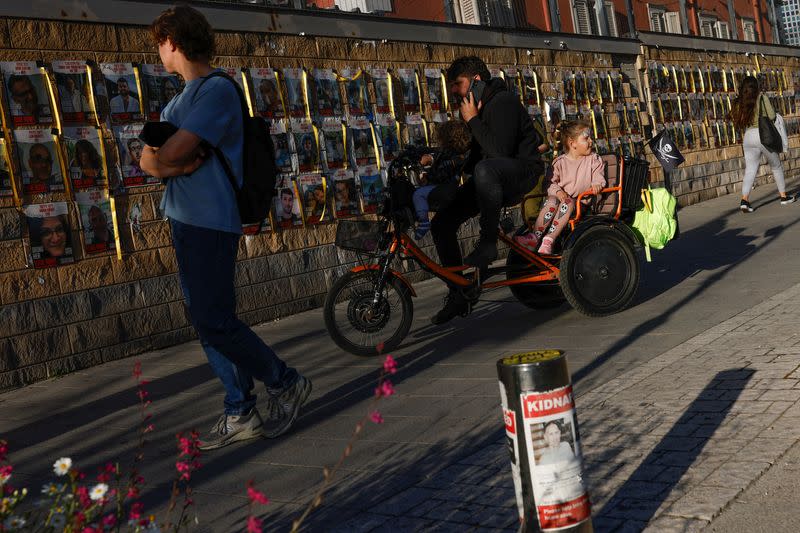Blinken begins Middle East tour with strains growing in US-Israel ties
By Nidal al-Mughrabi and Humeyra Pamuk
CAIRO/JEDDAH (Reuters) -U.S. Secretary of State Antony Blinken began a tour of the Middle East on Wednesday by holding talks in Saudi Arabia, hoping to secure a ceasefire in the Gaza war as increasing strain shows in Washington's relationship with its ally Israel.
In the Gaza Strip, where hunger is spreading and hopes were dashed for a ceasefire in time for Ramadan last week, residents of Gaza City in the north described the most intense fighting for months around the Al Shifa hospital.
Israel said it had killed 90 gunmen in a battle under way there for a third day. The Palestinian militant group Hamas, which Israel says it wants to eliminate, denied fighters were present and said those killed in the hospital were civilians.
After arriving in Saudi Arabia, Blinken met Prince Faisal bin Farhan, the Saudi foreign minister, and was expected to hold talks with ruling Crown Prince Mohammed bin Salman.
He will go on to Egypt, where he is expected on Thursday to meet the foreign ministers of Egypt, Saudi Arabia, Qatar and Jordan, the Emirati international cooperation minister and the secretary-general of the Palestinian Liberation Organisation.
Fighting has intensified in recent days in northern parts of Gaza captured by Israeli forces early in the nearly six-month-old war, including Al Shifa, once Gaza's biggest hospital, now one of the few even partially functioning in the north.
"We are living through similar dreadful conditions to when Israeli forces first raided Gaza City: sounds of explosions, Israeli bombardment of houses is non-stop," Amal, 27, living about a kilometre from Al Shifa hospital, said via a chat app.
Israel's military chief, Herzi Halevi, said Israeli forces were targeting Hamas leaders who he said were in the hospital compound.
"This is very, very important for pressuring Hamas, it's very important for pressuring the negotiations as well," he said in video remarks released by Israel's armed forces.
On Tuesday, Israeli Prime Minister Benjamin Netanyahu rebuffed a plea from U.S. President Joe Biden to call off plans for a ground assault of Rafah, the city on the southern edge of Gaza sheltering more than half the enclave's 2.3 million people.
Netanyahu told Israeli lawmakers he had made it "supremely clear" to Biden in a phone call "that we are determined to complete the elimination of these battalions in Rafah, and there's no way to do that except by going in on the ground".
Israel says Rafah is the last big holdout of armed fighters from Hamas. Washington says a ground assault there would be a "mistake" and cause too much harm to civilians.
State Department spokesman Matthew Miller said one of Blinken's aims was to discuss with Israeli leaders how to defeat Hamas "including in Rafah, in a way that protects the civilian population, does not hinder the delivery of humanitarian assistance and advances Israel’s overall security."
Miller said Blinken and Prince Faisal had discussed the urgent need to protect all civilians in Gaza and immediately increase humanitarian assistance, and underlined the importance of preparing for the phase following the end of the conflict.
Gazans, ordered into Rafah earlier in the war by advancing Israeli forces, have nowhere further to flee. Israel says it has a plan to evacuate them.
TENSION
The war began on Oct. 7 when fighters from Hamas, which controls the Gaza Strip, rampaged through Israeli towns, killing 1,200 people and capturing 253 hostages, according to Israeli tallies.
Nearly 32,000 Palestinians have been confirmed killed since, according to Gaza health authorities, with thousands more dead feared lost under the rubble.
Public tension between the Biden and Netanyahu administrations has grown as Israel pressed on with its offensive, and as disease and hunger spread in Gaza.
Last week, Chuck Schumer, leader of Biden's Democratic Party in the Senate and the highest-ranking Jewish U.S. elected official, called for Israeli voters to replace Netanyahu. Biden called it a "good speech"; Netanyahu called it "inappropriate".
Netanyahu is increasingly aligning with Biden's domestic political opponents in a U.S. presidential election year.
Netanyahu later addressed U.S. Republican senators in a video linkup to their weekly policy lunch on Wednesday, and then took questions from them.
"I made it clear to him that it's not the business of the United States to be giving a democratic ally advice about when to have an election or what kind of military campaign they may be conducting," U.S. Senate Republican leader Mitch McConnell told reporters afterwards.
Long-running Gaza ceasefire talks have resumed this week in Qatar after Israel rejected a counter-proposal from Hamas last week. Both sides have discussed a truce of around six weeks during which Hamas would release about 40 Israeli hostages in return for hundreds of Palestinian detainees.
But despite months of talks mediated by the U.S., Egypt and Qatar, Israel and Hamas still differ on what would follow any truce. Hamas says it will release hostages only as part of an agreement that would end the war; Israel says it will discuss only a temporary pause.
Senior Hamas official Osama Hamdan told a press conference in Beirut that Israel, in its note rejecting the latest Hamas offer, had retracted elements it had previously accepted.
As the death toll mounted this week, the international hunger monitor warned of mass death from famine in Gaza without an immediate ceasefire.
"Siege, hunger & diseases will soon become the main killer in #Gaza," Philippe Lazzarini, head of the U.N. agency for Palestinian refugees UNRWA, wrote on X on Wednesday.
"This fabricated + catastrophic level of hunger can still be reversed by flooding Gaza with food & life saving assistance. More than ever Humanity requires political will."
Israel says it is letting food in through more routes by land, sea and air, and blames aid agencies for failing to distribute it.
(Writing by Peter Graff and Timothy Heritage; Editing by Sharon Singleton and William Maclean)

 Yahoo News
Yahoo News 